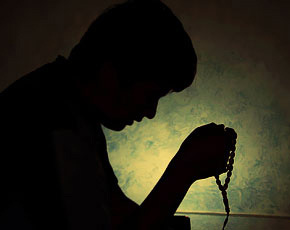
Painstakingly, she would collect all the myriad papers accumulated at our house which contained fragments of Quranic verse: flyers, newspaper clippings, wedding invitations, and God only knows what else. I don’t precisely recall what ‘respectful’ means she found of disposing of all that material. Perhaps there’s still an unopened drawer somewhere, stuffed with all of it.
At the time, I found it to be an unusual preoccupation. In retrospect however, I can appreciate the labour she put into the enterprise. Certainly, the material never ended up burnt or mangled, in the hands of an unwitting 11-year-old girl. The unfortunate Rimsha Masih, who did find herself in such a situation recently, now sits in a lock-up facing criminal charges for blasphemy.
Based on what I’ve read so far, I’m fairly confident that the man on whose instigation this travesty has occurred, one Khalid Jadoon, is a bully, a sadist, and a complete idiot. The tragedy however, lies not in Jadoon’s character (or lack thereof), but rather in the ambivalence and confusion which surrounds this incident in the Pakistani mind. Just as with the assassination of Salman Taseer and Shahbaz Bhatti, the ongoing massacre of Shia Muslims, and the periodic massacre of Ahmadis, a significant proportion of Pakistanis are unwilling to condemn the incident out of hand, as they should. The stumbling block which prevents them from doing so is the antagonists’ half-brained appeal to Shariah.
The status of Shariah in our society is an odd one. Our day-to-day life is dictated by it, as are our commercial transactions and the very functioning of our state. Yet I have still to come across any average Pakistani who has even a middling grasp of what the Shariah entails. The vast majority of so-called maulanas are even worse. Not only do they fail to grasp its most basic principles, but rather their minds are crammed with half-truths and misconceptions.
This is not a Pakistani problem, it is a Muslim problem. How else can one explain the absurd fatwas (i.e. juristic rulings based on Sharia) periodically propounded by purported Islamic scholars around the world: like the one denouncing Mickey Mouse as an agent of Satan; the one that mandates breast-feeding your co-workers; or how about the one that prohibits nudity during intercourse. Just to clarify, each of the above fatwas was by a noted and respected Islamic ‘scholar’ or ‘institute’. These men are said to be the most knowledgeable in the world regarding Islam.
It is a frustrating state of affairs. All the more so in the present case, where morality clearly points in one direction, and what is purported to be an Islamic dictate, points in a very different direction. A previous generation of ‘leftists’ chose to confront this frustration with denial; they called for a separation between theology and politics. History has taught us that this approach is not feasible. We live in the ‘Islamic Republic of Pakistan,’ a fact which is unlikely to change in the foreseeable future.
The only real solution is to confront the problem head-on. In this case, the ‘problem’ being the degradation of fiqh (i.e. the Islamic legal code), the abject intellectual squalor which it now inhabits, and its stagnation. For hundreds of years, while our understanding and appreciation of morality and ethics has steadily progressed, the Islamic legal code has remained stagnant. What is more, in the absence of actual intellectual analysis, it has fallen prey to superstition and myth, most notably by those purporting to be ‘Islamic scholars’.
So why are Muslims unwilling to stand up for something which they know to be right? Something which is clearly and undeniably ‘moral’? Why are scoundrels like Jadoon allowed to take center-stage in this legal debate, while educated, intelligent people sit on the sidelines? In my view, this absurd situation has come about due to the reluctance of the Muslim society to apply its rational thinking mind to the problem at hand. Its reluctance to study Islam in a critical way and to thresh the chaff from the wheat. It is neither wine nor swine but critical thought that is the greatest taboo for today’s Muslim.
To quote from M. H. Kamali’s Shari’ah Law (2009): “Judging from the precedent and example of the leading Companions, and the renowned ‘ulema’ of jurisprudence, we find that our contemporary scholars feel constrained in attempting legal reconstruction and ijtihad in tandem with the rapid pace of social change. This is partly due to the long history of unquestioning imitation (taqlid) which seriously disrupted the natural growth of fiqh and arrested the efflorescence of ijtihad. Ijtihad must continue at all time so as to keep the law abreast of the needs and changing conditions of society. The renowned closure of the doors of ijtihad at around the beginning of the 11th century has led to stagnation. Consequently, a gab has developed between the Shari’ah and the living conditions of people in many present-day Muslim societies.”
The vast intellectual exercise which Kamali refers to could well be the defining moment for this generation of Muslims. An opportunity to throw off the accumulated dust and debris of generations past. And for every moment that this intellectual exercise is delayed, we will have to bear the heavy burden of yet another Rimsha on our conscience.

The views expressed by this blogger and in the following reader comments do not necessarily reflect the views and policies of the Dawn Media Group.











































